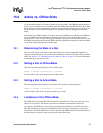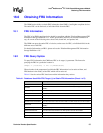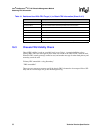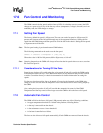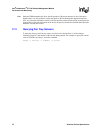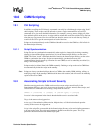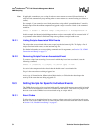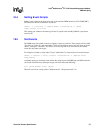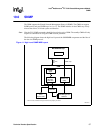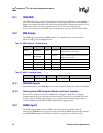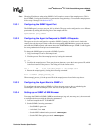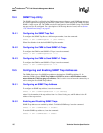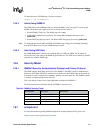
Intel
®
NetStructure
TM
ZT 7102 Chassis Management Module
CMM Scripting
94 Technical Product Specification
Note: If applicable, remember to set a script for when a sensor returns to normal (NormalAction). A
script will not automatically stop running when a sensor returns to a normal setting (no alarms or
events).
For example, if you wanted to run a blade powerdown script called “powerbladedown” stored in
/home/scripts when the ambient temperature triggered a major event for a blade 4, the command
would be:
cmmset –l blade4 –t “Ambient Temp” –d MajorAction –v “bladepowerdown 4”
In this example, the /home/scripts/bladepowerdown script or executable will be executed with “4”
as a parameter when blade4’s Ambient Temp sensor generates a major health event.
18.2.1 Listing Scripts Associated With Events
The scripts that are associated with events are put into the /etc/cmm.cfg file. To display a list of
scripts associated with events, cat the /etc/cmm.cfg file.
For further information on event scripting commands and its arguments, see Section 7.0, “CMM
Connection and Setup” on page 53.
18.2.2 Removing Scripts From an Associated Event
To remove scripts from occurring for an event in which they have been associated, issue the
following command:
cmmset –l [location] –t [target] –d [action type] –v none
Location is the component in the chassis that the health event is associated with.
Target is the sensor that was being triggered on.
Action type is NormalAction, MinorAction, MajorAction, or CriticalAction based upon the
severity of the event that was being triggered on.
18.3 Setting Scripts for Specific Individual Events
The CMM allows scripts to be associated with specific events which may not necessarily be health
related, such as the insertion or removal of a board from the chassis. This allows any single event
that can occur on the CMM to have an associated script, or scripts with it.
18.3.1 Event Codes
To allow the user to set scripts based on any event, a unique event code is assigned to each event
that can occur on the CMM. The list of events and the codes associated with each event is detailed
in Section 11.0, “Health Event Strings” on page 67.
..




